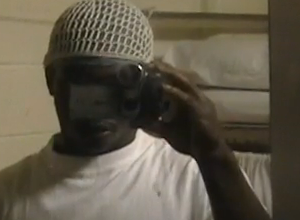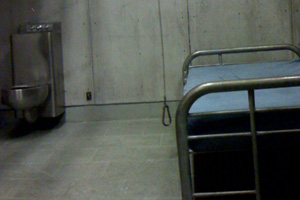In a protest that appears to be spreading through Georgia’s prison system, inmates are striking for better conditions. One interesting facet of this rare prison strike, which reaches across multiple facilities and across racial and factional lines, is the participants’ use of self-imposed lockdown to serve their own goals.
Lockdown, in which prisoners are confined to their cells for up to 24 hours a day, is routinely imposed on inmates for punishment or as a “security” measure. In this case, however, prisoners are refusing to leave their cells until their demands are taken seriously. The Georgia Corrections Department’s only response so far, ironically, has been to place the affected prisons on lockdown. As the New York Times reported:
“We’re not coming out until something is done. We’re not going to work until something is done,” said one inmate at Rogers State Prison in Reidsville. He refused to give his name because he was speaking on a banned cellphone…
The Corrections Department placed several of the facilities where inmates planned to strike under indefinite lockdown on Thursday, according to local reports.
“We’re hearing in the news they’re putting it down as we’re starting a riot, so they locked all the prison down,” said a 20-year-old inmate at Hays State Prison in Trion, who also refused to give his name. But, he said, “We locked ourselves down.”
The best roundup we’ve found of information and context on the strike appears today on Prison Law Blog, including a full list of the prisoners’ demands, excerpted below.
· A LIVING WAGE FOR WORK: In violation of the 13th Amendment to the Constitution prohibiting slavery and involuntary servitude, the DOC demands prisoners work for free.
· EDUCATIONAL OPPORTUNITIES: For the great majority of prisoners, the DOC denies all opportunities for education beyond the GED, despite the benefit to both prisoners and society.
· DECENT HEALTH CARE: In violation of the 8th Amendment prohibition against cruel and unusual punishments, the DOC denies adequate medical care to prisoners, charges excessive fees for the most minimal care and is responsible for extraordinary pain and suffering.
· AN END TO CRUEL AND UNUSUAL PUNISHMENTS: In further violation of the 8th Amendment, the DOC is responsible for cruel prisoner punishments for minor infractions of rules.
· DECENT LIVING CONDITIONS: Georgia prisoners are confined in over-crowded, substandard conditions, with little heat in winter and oppressive heat in summer.
· NUTRITIONAL MEALS: Vegetables and fruit are in short supply in DOC facilities while starches and fatty foods are plentiful.
· VOCATIONAL AND SELF-IMPROVEMENT OPPORTUNITIES: The DOC has stripped its facilities of all opportunities for skills training, self-improvement and proper exercise.
· ACCESS TO FAMILIES: The DOC has disconnected thousands of prisoners from their families by imposing excessive telephone charges and innumerable barriers to visitation.
· JUST PAROLE DECISIONS: The Parole Board capriciously and regularly denies parole to the majority of prisoners despite evidence of eligibility.













